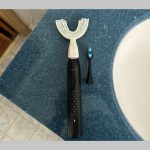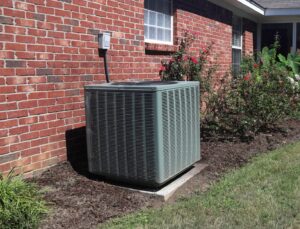
Electric heaters have been around for decades as a source of heat in homes to provide warmth to us. One of the reason for their popularity is because of lower cost to purchase and easy maintenance compared to other sources of heat. They are usually powered by electricity though a small percentage are still using propane or kerosene as fuel.
They work by converting electricity into heat using metals as heating elements. The metals have high resistance that permit a certain amount of current to flow though them to provide the required heat. Electrical energy is changed into heat energy and the the relationship between the wattage and Btu/hr is:
1 Watt = 3.415 Btu/hr.
Electric Resistance Heaters
There are three types of electric resistance heating wires that are in use today:
- Open Wire consists of nickel-chromium resistance wire, which is mounted on ceramic or mica insulation. For safety reasons, they must be protected and should not be contacted by users or metal objects. This protection is vital to preventing the danger of electric shock.
- Open Ribbon is similar in material to the open wire type but has more surface area that is exposed to air contact. It, too, must be protected to prevent the danger of electric shock to the users.
- Tubular cased wire uses nickel chromium resistance wire that is surrounded by a magnesium oxide powder which are then enclosed in a heat resistance steel tube. This tube protects the users from the danger of electric shock.

One of the commonly used natural convection heating equipment is known as Baseboard Heating Unit. This unit has electrical resistance mounted in a casing, which is designed to move air over the elements naturally for effective heat transfer. They are usually mounted under the window on the wall.
When purchasing units, make sure that they have safety features such as wire grills, automatic shutoff controls in the event of overheating, tilt switches, and good thermostat controls. Look for certification on the units such as UL or CE Mark.
Other Types of Electric Heaters for Homes
There are several types of electric heaters homeowners commonly use today. The two main categories are convection heaters and radiant heaters.
Convection heaters, like baseboard heaters, work by heating the air around them, which then circulates the warm air through the room naturally or with the assistance of a fan. Radiant heaters emit infrared radiation (i.e., radiant heat) that directly heats objects and people in the room. Both use electric elements to warm your home.
Some common types of electric heaters include:
- Baseboard heaters
- Space heaters
- Wall heaters
- Infrared heaters
- Ceramic heaters
- Oil-filled radiators
- Electric furances
Pros and Cons of Using an Electric Heater
The advantages of using electric heaters are:
- Initial Low-Cost Investment. The units are usually lower in cost compared to other types of heating sources.
- Clean Operation. There isn’t any need for refrigerant, oxygen, or fossil fuels; hence, the operation is neat and clean.
- No Toxic Gases. Since no combustion is needed, there is no danger of toxic gases that may leak in the event of faulty units. No chimney is needed, unlike the traditional coal or wood source of heating.
- Smaller in Size. They take up smaller space compared to other systems that produce a similar amount of heat.
- Ease of Control. Individual unit temperature can be controlled more precisely using the thermostat mounted on the unit.
- Ozone Friendly. Since no refrigerant is involved, this type of heat source is more ozone-friendly.
The disadvantages of using electric heaters are:
- Humidity control may be a problem.
- Higher Cost/unit of heat compared to other fuels.
Final Thoughts
Electric heaters are a convenient and efficient way to add warmth to your home — whether as a supplement to your HVAC system or your primary heat source. They convert electricity to heat using heating elements with high resistance levels or through other technology. However, like any appliance, they require regular maintenance to function safely and effectively.
If you have any concerns about your electric heaters, don’t hesitate to contact a qualified electrician or home services professional for assistance.
Frequently Asked Questions
How do electric heaters convert electricity into heat?
Most electric heaters use resistor heating elements made of metals like nickel-chromium that convert electrical energy into heat when you pass an electric current through them.
Are electric heaters energy efficient?
Electric heaters are very efficient at converting electricity into heat. However, they are often more expensive to operate than traditional heating systems, like a gas furnace or heat pump, depending on electricity costs.
Can electric heaters cause fires?
Electric heaters are safe when you use them correctly. However, they can be a fire hazard if you put them too close to flammable materials, cover them up, or not maintain them correctly.
Article Update Log
.

Alora Bopray
Staff Writer
Alora Bopray is a digital content producer for the home warranty, HVAC, and plumbing categories at Today’s Homeowner. She earned her bachelor’s degree in psychology from the University of St. Scholastica and her master’s degree from the University of Denver. Before becoming a writer for Today’s Homeowner, Alora wrote as a freelance writer for dozens of home improvement clients and informed homeowners about the solar industry as a writer for EcoWatch. When she’s not writing, Alora can be found planning her next DIY home improvement project or plotting her next novel.

Jonathon Jachura
Contributor
Jonathon Jachura is a two-time homeowner with hands-on experience with HVAC, gutters, plumbing, lawn care, pest control, and other aspects of owning a home. He is passionate about home maintenance and finding the best services. His main goal is to educate others with crisp, concise descriptions that any homeowner can use. Jon uses his strong technical background to create engaging, easy-to-read, and informative guides. He does most of his home and lawn projects himself but hires professional companies for the “big things.” He knows what goes into finding the best service providers and contractors. Jon studied mechanical engineering at Purdue University in Indiana and worked in the HVAC industry for 12 years. Between his various home improvement projects, he enjoys the outdoors, a good cup of coffee, and spending time with his family.






Leave a Reply